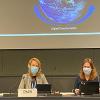News
Displaying Results 26 - 38 of 38
“Countries need to take concrete actions to prevent, prepare for and respond to industrial accidents and reduce the risks of related technological disasters. The UNECE Convention on the Transboundary Effects of Industrial Accidents and the tools developed for its implementation provide a means to…
From the Sandoz chemical spill of 1986 in Schweizerhalle, Switzerland, to the rupture of a dam storing mine tailings containing cyanide in Baia Mare, Romania, 2000; and last year in Beirut, the explosion of ammonium nitrate stored in warehouse near residential areas, what these chemical and…
This year, the UNECE region has seen devastating impacts of climate change and multiple natural disasters, such as the floods in Belgium, the Netherlands and Germany. Disasters caused by natural hazards, on the rise due to climate change, can also trigger technological accidents.
On today’s…
A 5-day event in Geneva will provide a platform for some 400 representatives of Governments, international organizations, civil society and other stakeholders to meet in a hybrid format and discuss achievements and challenges in the promotion of transparency, public participation in decision-making…
UNECE is deepening its support to help countries of the region capitalize on innovation to recover from the pandemic and realize the ambitious vision of the 2030 Agenda.
The UNECE Innovation for Sustainable Development Review (I4SDR) of Uzbekistan, which is currently underway, will set out…
Setting the major directions to strengthen effective public participation and access to information and justice by 2025 was the focus of the twenty-fifth meeting of the Working Group of the Parties to the Convention on Access to Information, Public Participation in Decision-Making and Access to…
To reduce transmission of the novel coronavirus, Governments in the UNECE region introduced social distancing and other measures, which have often included restrictions on the freedoms of assembly and of movement. Consequently, there has been an impact on procedural rights of public participation…
Systemic deficiencies with regard to access to information, decision-making or compliance with environmental law can seriously threaten successful implementation of circular and green economy and sustainable development. Taking a case to court to advance a widely shared public interest remains an…
After months of the COVID-19 crisis challenging healthcare systems and undermining economies, governments worldwide are looking for ways to jump-start the economic recovery. Without factoring in environmental concerns, recovery packages risk undermining the foundations for sustainable development, …
Effective public access to environmental information is critical for promoting a green and circular economy, increased biosafety and community resilience. The need to further such access using modern digital technologies has been increasingly voiced across countries in the light of the coronavirus…
The COVID-19 pandemic has caused wide-ranging effects on human health, security and economic activity, which have significantly impacted industrial safety.
The eleventh meeting of the Conference of the Parties to UNECE’s Convention on the Transboundary Effects of Industrial Accidents (Industrial…
UNECE is supporting Armenia, Azerbaijan, Belarus, Georgia, the Republic of Moldova and Ukraine to further enhance strategic environmental assessment (SEA) and transboundary environmental impact assessment (EIA) to prevent and mitigate damage to the environment and health from economic growth. A…
UNECE and the European Union continue to support pilot applications of the Strategic Environmental Assessments (SEA) in Belarus and Georgia in the framework of the European Union Water Initiative Plus programme for the Eastern Partnership Countries (EUWI+). SEA is an essential planning tool for…











